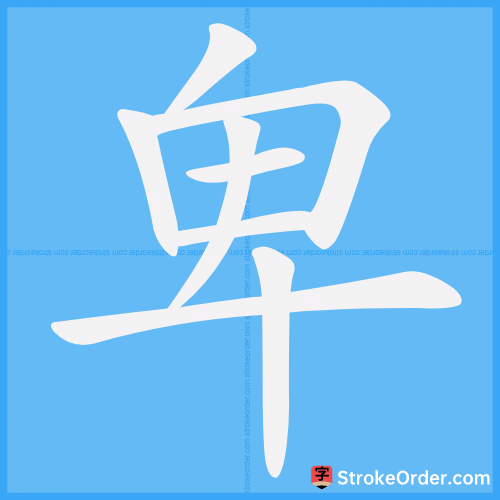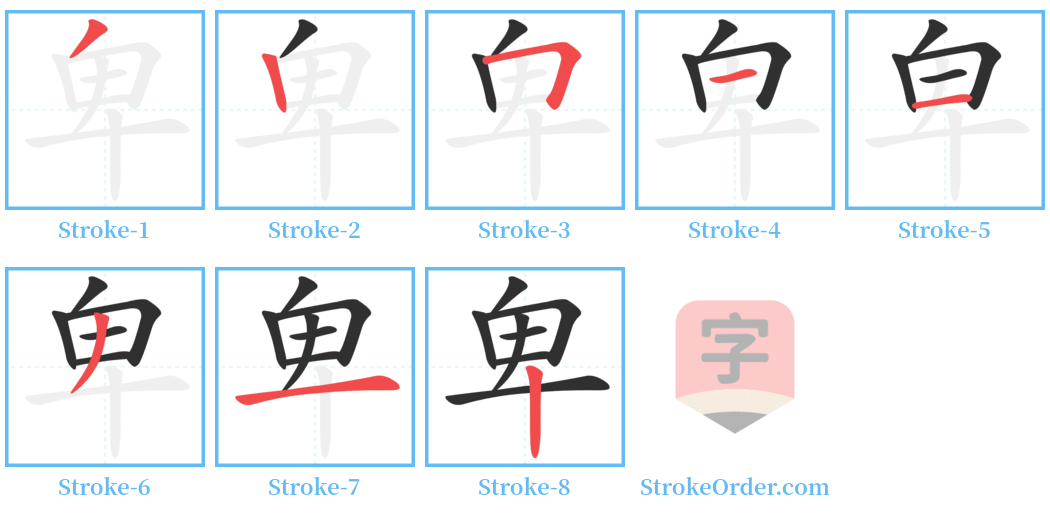卑 Stroke Order
Animated Stroke Order of 卑

Stroke Order Diagrams for 卑

Step-by-Step Handwriting Guide for 卑

Learn to Write Chinese Characters with Video Tutorials
Watch the video of writing the Chinese character "卑", learn the correct stroke order (笔顺) of the character "卑", and master the standard way of writing the character "卑".
Free Printable Handwriting Practice with Stroke Order: 卑
Printable Writing Practice Worksheet of "卑" in Portrait Orientation (Tian Zi Ge)

Printable Writing Practice Worksheet of "卑" in Landscape Orientation (Tian Zi Ge)

Information of 卑
Pinyin
bēi
Radical
十
Strokes
8 strokes
Usage
★★★★★
Definition
low / base / vulgar / inferior / humble
卑 [bēi]
形
1. 低下,低劣。
Low and degrading; humble: 卑鄙 (despicable), 卑下 (inferior), 卑劣 (infamous), 卑微 (humble), 卑怯 (timid), 卑恭 (courteous). 地势卑湿 (the terrain is low and damp). 卑以自牧 (maintain humility to improve one's character).
2. 古同“俾”,使。
In ancient times the same as “俾”, meaning to make or allow.
引
1. 《广雅》:卑,庳也。
"In 'Guangya': 卑 means to be low."
2. 《书·无逸》:文王卑服。
"In 'Book of Documents': King Wen was humble in attire."
3. 《管子·水地》:人皆赴高,己独赴下卑也。
"In 'Guanzi, Water Land': Everyone strives for the high, yet one alone chooses the lowly."
4. 《易·系辞》:天尊地卑。
"In 'Yijing, Xi Ci': Heaven is exalted and Earth is lowly."
5. 唐· 韩愈《师说》:位卑则足羞。
"Tang Dynasty Han Yu's 'On Teachers': A low position is a source of shame."
6. 诸葛亮《出师表》:先帝不以臣卑鄙。
"Zhuge Liang's 'Memorial on the Expedition': The Late Emperor did not regard me as lowly and base."
例
又如:
卑弁 (self-reference of a subordinate military position),
卑寒 (humble expression; refers to being lowly and poor),
卑陋 (low and shabby),
卑辱 (degrading and humiliating),
卑人 (a low-status person).
3. 地势低下。与“高”相对。
Terrain is low; opposite of high: 卑小 (petty), 卑隘 (low and narrow), 卑洼 (depression).
4. 衰微,衰弱。
Feeble; weak:
引
1. 《国语·周语》:王室其将卑乎?
"In 'Guoyu, Zhou Yu': Will the royal family become lowly?"
5. 素质低下。
Inferior:
引
1. 宋濂《送东阳马生序》:非天质之卑,则必不若余之专耳。
"In Song Lian's 'Farewell to Dongyang Ma Shenger': If not for the inferiority of one's natural endowment, one would certainly be more specialized than I."
6. 谦恭。
Modest and courteous:
引
1. 《史记·魏世家》:卑礼厚币以招贤者。
"In 'Records of the Grand Historian': Use humble rituals and generous gifts to attract the wise."
例
又如:
卑谨 (humble and respectful),
卑顺 (humble and obedient).
动
1. 轻视,小看。
Look down on:
引
1. 《国语·晋语四》:何以卑我?
"In 'Guoyu, Jin Yu Si': Why do you look down on me?"
2. 汉· 晁错《论贵粟疏》:吏之所卑,法之所尊也。
"Han Dynasty Chao Cuo's 'On the Valuation of Grain': Where the officials are lowly, the law is respected."
例
又如:卑侮王室 (look down and insult the members of the royal family).
2. 低俯。
Bow:
例
如:卑身贱体 (to bow and humble oneself),
卑躬 (to lower one’s body, to bend low).
neither haughty nor humble / neither overbearing nor servile / neither supercilious nor obsequious
Input Method for 卑
Pinyin
bei1
Wubi
rtfj
Cangjie
hwhj
Zhengma
njed
Four Corner
26400
Unicode
U+5351
Same Pronunciation Characters